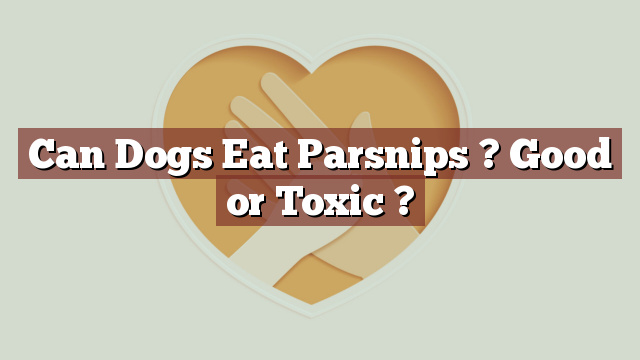Can Dogs Eat Parsnips? Good or Toxic?
Knowing which foods are safe for your dog to eat is crucial in maintaining their overall health and well-being. While some human foods can be shared with our furry friends, others can pose a significant risk to their health. In this article, we will delve into the topic of whether or not dogs can safely consume parsnips, a popular root vegetable.
Nutritional Value of Parsnips: Essential Vitamins and Minerals
Parsnips are packed with essential vitamins and minerals that can provide numerous health benefits to humans. They are an excellent source of dietary fiber, which aids in digestion and promotes a healthy bowel movement. Additionally, parsnips contain high levels of potassium, vitamin C, and folate, all of which play vital roles in maintaining optimal health.
Are Parsnips Safe for Dogs to Eat? Potential Toxicity Explained
Can dogs eat parsnips? The answer is yes, dogs can eat parsnips. Parsnips are not toxic to dogs, making them a safe addition to their diet. However, it is important to note that moderation is key. Feeding large quantities of parsnips to your dog can lead to gastrointestinal upset, such as diarrhea or stomach discomfort. Therefore, it is best to introduce parsnips gradually and in small portions to avoid any potential digestive issues.
Potential Risks or Benefits of Dogs Consuming Parsnips
While parsnips are generally safe for dogs, it is essential to be aware of potential risks and benefits associated with their consumption. The fiber content in parsnips can be beneficial for dogs with digestive issues or constipation. It aids in regulating bowel movements and maintaining a healthy digestive system. However, excessive fiber intake can have the opposite effect, causing loose stools or diarrhea. Therefore, it is crucial to monitor your dog’s reaction to parsnips and adjust the portion size accordingly.
What to Do If Your Dog Eats Parsnips: Steps to Take
If your dog happens to consume a large amount of parsnips or experiences any adverse effects after ingestion, it is important to take the appropriate steps. At the first sign of gastrointestinal distress, such as vomiting or diarrhea, it is recommended to withhold food for a few hours to allow their stomach to settle. After this brief fasting period, reintroduce bland and easily digestible foods such as boiled chicken or rice. If the symptoms persist or worsen, it is advisable to consult your veterinarian for further guidance.
Conclusion: Moderation and Consultation is Key
In conclusion, dogs can eat parsnips without experiencing any toxicity issues. However, it is crucial to exercise caution and feed parsnips to your dog in moderation. Like any new food, it is recommended to introduce parsnips slowly and monitor your dog’s reaction. If you have any concerns or if your dog shows any signs of discomfort after consuming parsnips, it is always best to consult with your veterinarian. They can provide expert advice tailored to your dog’s specific needs, ensuring their safety and well-being. By being mindful of safe food choices and seeking professional guidance when needed, you can ensure a healthy and happy life for your beloved canine companion.
Thank you for investing your time in exploring [page_title] on Can-Eat.org. Our goal is to provide readers like you with thorough and reliable information about various dietary topics. Each article, including [page_title], stems from diligent research and a passion for understanding the nuances of our food choices. We believe that knowledge is a vital step towards making informed and healthy decisions. However, while "[page_title]" sheds light on its specific topic, it's crucial to remember that everyone's body reacts differently to foods and dietary changes. What might be beneficial for one person could have different effects on another. Before you consider integrating suggestions or insights from "[page_title]" into your diet, it's always wise to consult with a nutritionist or healthcare professional. Their specialized knowledge ensures that you're making choices best suited to your individual health needs. As you navigate [page_title], be mindful of potential allergies, intolerances, or unique dietary requirements you may have. No singular article can capture the vast diversity of human health, and individualized guidance is invaluable. The content provided in [page_title] serves as a general guide. It is not, by any means, a substitute for personalized medical or nutritional advice. Your health should always be the top priority, and professional guidance is the best path forward. In your journey towards a balanced and nutritious lifestyle, we hope that [page_title] serves as a helpful stepping stone. Remember, informed decisions lead to healthier outcomes. Thank you for trusting Can-Eat.org. Continue exploring, learning, and prioritizing your health. Cheers to a well-informed and healthier future!

